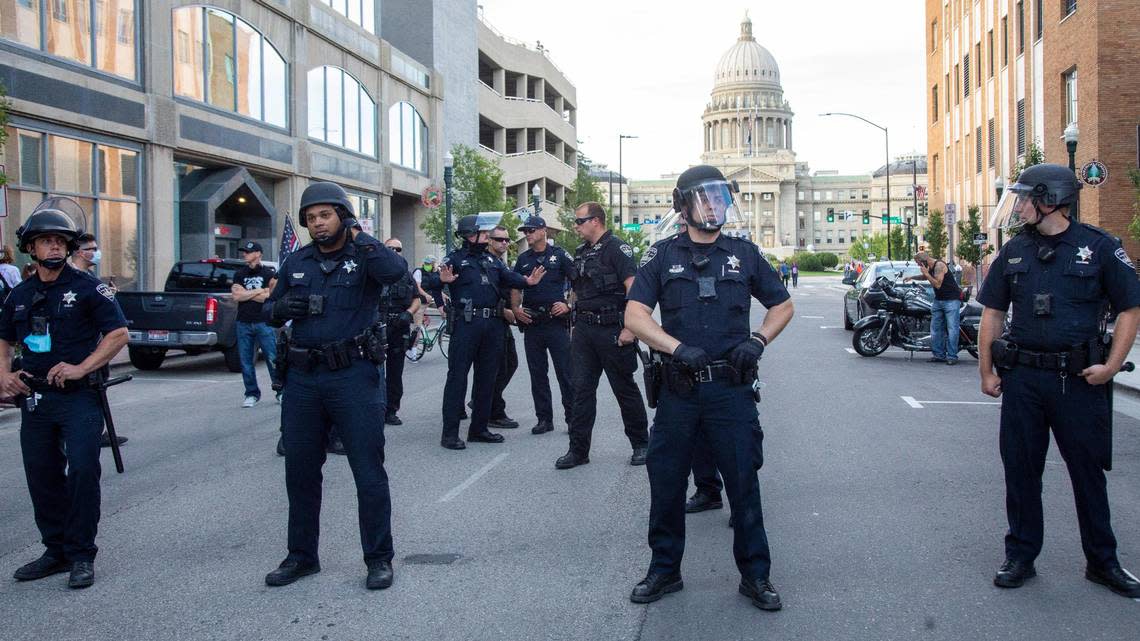Hey Boise, before we lower the bar for police, we need to have a conversation about it

The Boise Police Department’s decision to scrap a college requirement before someone can apply to be a Boise police officer needs a more thorough review.
Boise is following the suit of other cities, such as Chicago and Philadelphia, that have changed their police officer education qualifications, as Idaho Statesman reporter Ian Max Stevenson reported. In Boise’s case, the requirement was 60 college credit hours, the equivalent of an associate’s degree.
The Boise Police Department is responding, in part, to a shortage of officers. Boise Police is authorized to have 328 sworn officers, and has only 298. And the department is seeing fewer candidates — just like all employers fighting for applicants in a nationwide labor shortage.
But a recent peer-reviewed study of 235 large U.S. cities between 2000 and 2016 found that police forces requiring at least a two-year college degree for employment are less likely to employ officers who engage in actions that cause the deaths of unarmed citizens and of Black citizens.
The study, published this year in the Journal of Police and Criminal Psychology, found college minimums were associated with as much as three times lower rates of police-related fatalities involving Black people than police forces without a college degree requirement, and more educated police were also responsible for unarmed citizens dying at a rate two times lower than their counterparts.
Is lowering hiring standards a better option than raising pay, benefits and working conditions?
Raising pay, benefits and working conditions would certainly attract more applicants.
New officers with the Boise Police Department earn about $56,000 per year, while lateral officers earn around $71,000, according to the department’s website.
We recognize that raising pay in Boise would have a trickle-down effect, as officers from Canyon County, Meridian and the Ada County Sheriff’s Office could jump ship and move over.
Canyon County Sheriff Kieran Donahue last month urged raises across the board for his force — his department of 275 officers had a shortage of 31 positions.
Boise city officials would have to take into consideration the impact that raising salaries would have on the budget, of course. For fiscal year 2023, the city is projected to spend $84.5 million on police services, which makes up roughly 28% of the total general fund budget. This comes at a time when skyrocketing property taxes are taking a toll on local homeowners.
Still, could a decision to forgo raising salaries in favor of lowering standards prove to be penny-wise and pound-foolish?
The change in policy seems solely a measure to get more applicants, not necessarily better applicants or better outcomes. The college requirement only supports that the applicant has basic adult education capabilities.
If we want a safe police force for Boise, it is critical that applicants are thoroughly screened and even have some type of training conducted by an outside source, at minimum, to ensure they don’t have a propensity for violence, prejudicial thought/action or other concerning behaviors.
Competition for attracting and retaining talent is only going to intensify over the next several years, as the labor shortage continues, and lessening the standards is not a sustainable model.
Lowering the education requirement feels like a decision to lower the expectations of how police operate. It seems to be a move out of desperation that could have serious ramifications as law enforcement becomes only more complex and as Boise grows.
We would like to see a more thorough review of the the potential impact of reducing education standards for Boise police officers and whether there are better ways to increase not only the quantity, but the quality of applicants.
At the very least, Boise taxpayers deserve a more robust discussion of this issue.
Statesman editorials are the unsigned opinion of the Idaho Statesman’s editorial board. Board members are opinion editor Scott McIntosh, opinion writer Bryan Clark, editor Chadd Cripe, newsroom editors Dana Oland and Jim Keyser and community members Johanna Jones and Maryanne Jordan.

